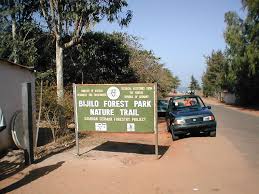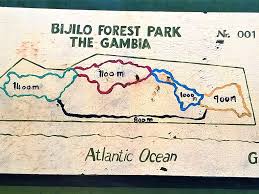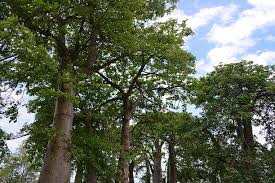Bijilo Forest Park: Difference between revisions
No edit summary |
No edit summary |
||
| Line 29: | Line 29: | ||
*Trees: Tall mahogany trees, baobab trees, and other native species | *Trees: Tall mahogany trees, baobab trees, and other native species | ||
*Birds: Over 100 species of birds, including the grey parrot, the red-chested sunbird, and the black-headed weaver | *Birds: Over 100 species of birds, including the grey parrot, the red-chested sunbird, and the black-headed weaver | ||
*Mammals: The African civet, the genet, and the patas monkey | *Mammals: The African civet, the genet, and the patas monkey | ||
*Reptiles: The Nile crocodile, the African rock python, and the African bush viper | *Reptiles: The Nile crocodile, the African rock python, and the African bush viper | ||
Revision as of 12:41, 26 February 2025
Bijilo Forest Park
Location: Bijilo, The Gambia
Coordinates: 13.4388° N, 16.6559° W



Image of Bijilo Forest Park - a photo of the forest, or a map showing its location.
Overview
Bijilo Forest Park is a small but significant protected area located on the outskirts of the coastal town of Bijilo in The Gambia. It is a popular destination for visitors seeking a glimpse of the country's diverse flora and fauna, as well as a tranquil escape from the bustle of city life.
History
Bijilo Forest Park was established in 1987 with the aim of protecting the remaining patches of coastal forest in The Gambia. The area had previously been threatened by deforestation and land degradation.
Flora and Fauna
The park is home to a variety of plant and animal life, including:

- Trees: Tall mahogany trees, baobab trees, and other native species
- Birds: Over 100 species of birds, including the grey parrot, the red-chested sunbird, and the black-headed weaver
- Mammals: The African civet, the genet, and the patas monkey
- Reptiles: The Nile crocodile, the African rock python, and the African bush viper
Activities
Visitors can enjoy a range of activities in Bijilo Forest Park, including:
- Guided nature walks: Expert guides can provide information about the park's biodiversity and its ecological significance.
- Birdwatching: The park is a popular destination for birdwatching, offering opportunities to observe a wide variety of species.
- Picnic areas: There are picnic areas located within the park, offering a serene escape from the hustle and bustle of life.
- Hiking trails: The park offers several hiking trails that wind through the forest, offering stunning views of the surrounding landscape.
Conservation Efforts
Bijilo Forest Park is actively involved in conservation efforts to protect the park's biodiversity and its ecological integrity. This includes working to reduce the threats of deforestation, habitat loss, and illegal wildlife trade.
Getting There
Bijilo Forest Park is easily accessible from the coastal town of Bijilo. It is a popular destination for visitors staying in the nearby resort areas of Kololi and Senegambia.
Visiting Information
- Opening Hours: Daily, 8am - 5pm
- Entrance Fee: A small fee is charged for entry.
- Accommodation: Several hotels and guesthouses are located near the park.
Learn More
- Visit The Gambia: https://www.visitthegambia.com/